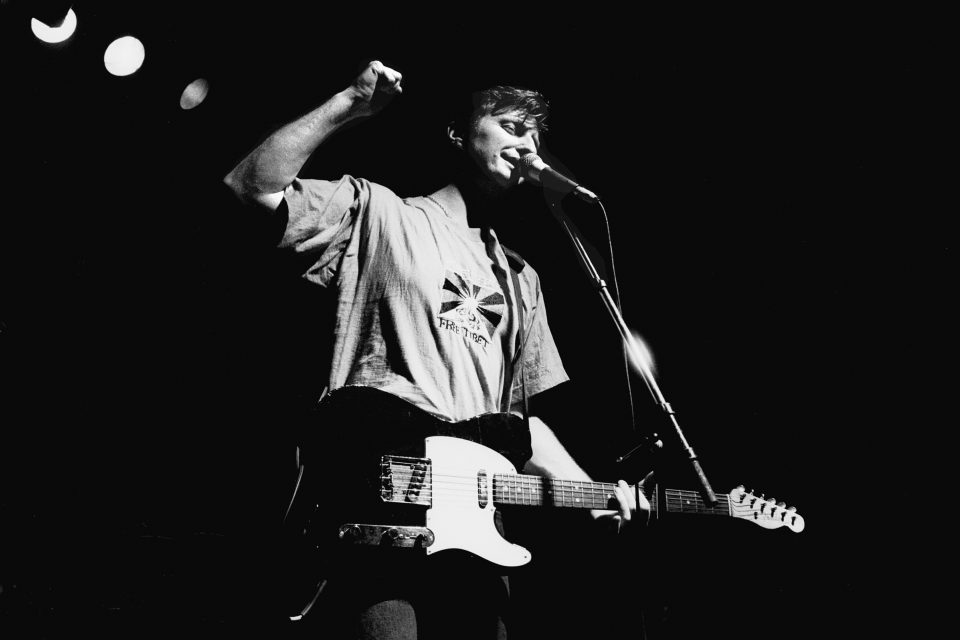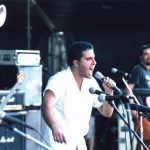Protest songs and the importance of Billy Bragg
A new bumper release celebrates 36 years of the career of British singer-songwriter Billy Bragg, including previously unreleased material.
Author:
6 November 2019

A new compilation of live recordings shines a spotlight on the 36-year career of London’s famous protest poet, Billy Bragg. Released on 20 September, Best of Billy Bragg at the BBC: 1983-2019 contains 38 live recordings, driving home his position as arguably one of the finest songwriters of all time.
The collection contains highlights from Bragg’s sessions recorded for radio deejays at the British Broadcasting Corporation (BBC), including John Peel, David Jensen, Janice Long and Bob Harris. Most of the material on this recording is previously unreleased. Bragg has had a varied and fascinating career as a songwriter, and listening to Best of Billy Bragg affirms how important his writing has been for almost four decades.
Bragg was born into a working-class family in the London suburb of Barking in 1957, where young men with no university prospects faced bleak choices. One option was a life working at the Ford car plant, another was to join the army, air force or navy. Bragg, a self-confessed “smart-ass” at the time, who was fired up on punk music, had other plans, although he would join the army for a few months after his punk band Riff Raff fell apart.
The singer-songwriter has often referred to 1976’s Rock Against Racism movement and London punk band The Clash as his reasons for becoming politicised, and says it was the do-it-yourself sensibility of punk that inspired him to take his teenage songwriting more seriously. What followed were almost four decades of highly charged political protest songs about war, fascism, labour unions, former prime minister Margaret Thatcher and her neoliberal agenda, and some of the most beautiful love songs ever written.
Bragg has the ability to effortlessly combine the personal and the political in the same lyric, the type of songwriting that is difficult to achieve without sounding contrived.
Lyrics, love and the world’s state
A perfect example is Waiting for the Great Leap Forwards from his 1988 album, Workers Playtime, which seems to effortlessly cohere lyrics about the state of the world at the end of the Cold War and the dilemma of using pop music to convey political messages.
From 1967 until his death in 2004, Peel invited musicians he liked to record a live session on his show. These sessions became known as the Peel Sessions and Bragg was no stranger to them.
He recalls that Peel used to describe these evening BBC recording sessions as “offering artists the opportunity to try out new songs in a studio environment”.
Related article:
“That’s how I looked at them, too,” Bragg confirms. “The songs were so new, you can hear I’m still feeling my way into them, several were conceived and written the night before the session.
“In one case, I actually composed a song from scratch while the show was on air,” he adds. “That rawness was always a key component of my BBC sessions, the thrill of putting something out there for the very first time.”
A perfect example of what Bragg is talking about comes from a live session for Jensen, recorded a few days before Christmas 1983. Bragg recorded two songs for that session, Like Soldiers Do and The Saturday Boy, which would eventually be re-recorded seven months later for his second album, Brewing Up With Billy Bragg, released in November 1984, almost a full year after he debuted the songs on the BBC.
The BBC recording of The Saturday Boy presents the song stripped of the echo and reverb-dominated treatment it received on Brewing Up With Billy Bragg, making this delicate declaration of love even more intimate. When Bragg delivers lines like, “I never made the first team, I just made the first team laugh” and “I had to look in the dictionary, to find out the meaning of unrequited”, the poet’s awkward confessions of the heart are even more endearing.
Gems from the Peel Sessions
The recording of A New England from a Peel Session in late July 1983 came just five months after Bragg’s debut album, Life’s a Riot with Spy vs Spy, hit the shelves. However, it is the other two selections from this Peel Session that are more revelatory. The first is a raucous cover of John Cale’s Fear is a Man’s Best Friend and the second is a recording of Love Gets Dangerous, which in July 1983 was an unreleased outtake from Bragg’s debut album. On the Cale cover, Bragg’s guitaring reaches moments of wild metallic cacophony, while his vocal performance has a real punk energy. Fear is a Man’s Best Friend and Love Gets Dangerous are reminders that while Bragg may have settled into a position as elder statesmen of protest music, he was once just an angry punk.
While Best of Billy Bragg is a significant document of Bragg’s recordings for the BBC, it does not make 1987’s The Peel Sessions, with a mere 13 songs, as redundant as you might expect. If you want to hear Bragg’s BBC recording of Chile Your Waters Run Red Through Soweto or his rewrite of Florence Reece’s 1931 song, Which Side Are You On?, which she wrote during the Harlan County miners’ strike of that year, you will still need to get your hands on that release from more than 30 years ago.
Related article:
Most of Bragg’s famous songs are, however, included on the collection, including a 2011 recording of Levi Stubbs Tears from Glastonbury, a 1985 recording of There is Power in a Union and a 1988 recording of She’s Got a New Spell.
However, it is some of the rarer songs that offer up the most delight on this compilation. Bragg’s 1984 take on Bobby Troup’s 1946 song, Route 66, made famous by Nat King Cole, is a highlight. Renamed A13, Trunk Road to the Sea, it’s a rollicking punk take on a song that is considered a rhythm and blues standard.
Another highlight is a 2017 recording of Woody Guthrie’s I Ain’t Got No Home, from the Radio 2 Folk Awards. Bragg recorded the song for his stellar 2014 album Tooth & Nail, but this live recording is special, with Bragg offering up a slower, more contemplative interpretation of the song. No-One Knows Nothing Anymore, originally also recorded for Tooth & Nail, pops up in the form of a live recording from the Latitude Festival in July 2014, while a 1991 recording of Accident Waiting to Happen is another gem.
Fans will surely celebrate this great archival release from Bragg, but newcomers will also find that Best of Billy Bragg is a great overview of a spectacular musical career from a man who consistently manages to reach people’s hearts and minds with his powerful songs.


